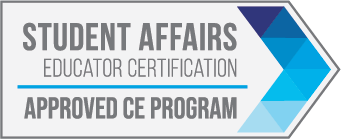
Exploring Inclusion of College Students with Intellectual and/or Developmental Disabilities (IDD) within Campus Recreation at the Organizational Level
-
Register
- Nonmember - $60
- Member - $30
- Institutional Member - Free!
- Premier Member - Free!
There are approximately 8 million Americans who have an intellectual and/or developmental disability (IDD), and the number of these individuals attending U.S. colleges has significantly increased in the past five years. This increase is largely due to 340 and counting inclusive postsecondary education (IPSE) programs at universities and colleges across the U.S. that are designed to create and expand inclusive higher education experiences for individuals with IDD. This learning program will describe the methods, results, and practical implications of a NIRSA-funded research study that aimed to better understand the attitudes and perspectives of campus recreation staff, as well as the presence or absence of best practices for inclusive service delivery that shape the overall cultural context of campus recreation departments in regard to disability inclusion.
Learning Outcomes
1. Describe the feelings of campus recreation staff included in this research study in regard to individuals with IDD and inclusive service delivery.
2. Describe the beliefs of campus recreation staff included in this research study in regard to individuals with IDD and inclusive service delivery.
3. Describe the intentions of campus recreation staff included in this research study in regard to individuals with IDD and inclusive service delivery
4. Identify best practices for inclusive service delivery for individuals with IDD within campus recreation.
5. Formulate ideas for applying knowledge gained about inclusive service delivery for individuals with IDD within their own campus recreation departments.
Continuing Education Credits
Participants who complete this program will be eligible for Continuing Education (CE) credits in either the Core Student Affairs Educator Certification (CSAEd™) or Certified Student Affairs Educator-Campus Recreation (CSAEd-CR™).
NIRSA has been approved by the Higher Education Consortium for Student Affairs Certification to provide CE credit for Certified Student Affairs Educators (CSAEd™). NIRSA is solely responsible for all aspects of this program.
This webinar qualifies for the amount and types of CE credit listed below:
- CE Credit value: 1
- CE Credit Type: Core, Campus Recreation Specialty
- CE Credit Domain: Social Justice & Inclusion

How to get CE credits for attending this course:
- Attend the live webinar or watch the webinar recording once published to this page
- Upon completion, submit a program evaluation at this link
- Within two weeks of completing the survey, you should receive a certificate of completion via email
